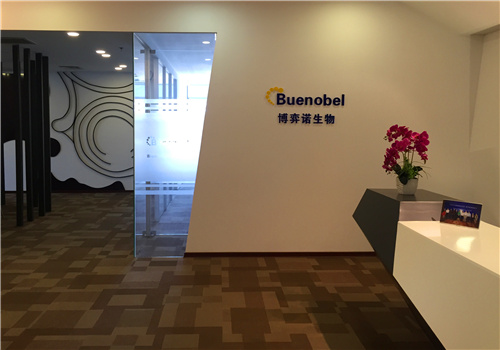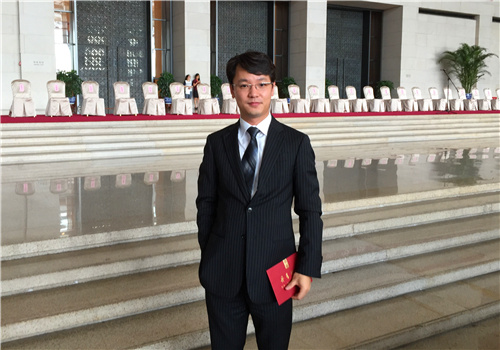
Editor's Note: When American Dreams in China was released in 2013, it became an overnight success, making 500 million yuan ($75 million) at the box office in China. Themed on "entrepreneurship and dreams", the movie is based on the story of a real-life English-language training school in China, New Oriental Education & Technology Group, and the three young men who founded it. And now, the Wuxi National Hi-tech District (WND) is seeing three entrepreneurs of its own chasing their big dreams.
Dr. Thomas C. Südhof, the 2013 Nobel Prize laureate in physiology, joined hands with Yi Eve Sun, a famous Chinese scientist in neuropsychiatry research and Zhang Bo, a MBA degree holder graduating from University of Northern Virginia, establishing Buenobel Biological Technology (Wuxi) Co.
Buenobel Biological Technology is a global advocate for precise medicine and diagnosis, providing services to customers utilizing high-throughput DNA and RNA sequencing technology, multi protein biomarker detection, and biological big data analysis. It is dedicated to serving scientific institutes, industry R&D, and clinicians for better understanding, prevention, diagnosis and treatment of diseases.
Business startup is all about choices

Südhof, a professor at Stanford University has been engaged in research on cell physiology and neurophysiology for many years. He chose Wuxi as the base of Buenobel due to the city's advanced technology, excellent talents and favorable entrepreneurial environment.
As an adopted son of Wuxi, Südhof has a deep relationship with the city. He fell in love with his present wife Chen Lu, a Wuxi native, whom he met at an academic seminar. Chen is an associate professor of neurobiology herself, and was awarded a MacArthur Fellowship in 2005.
At the same time, Zhang Bo, the present CEO of Buenobel, and his startup team were making great strides in biomarker research. Biomarkers are indicators which allow for the early detection of illnesses or diseases. The company has clients in pharmacy, biotechnology and diagnostics around the world. The startup team became partners with US-based Aushon BioSystems in 2009, a provider of protein biomarker measurement and analysis services.
Südhof and Zhang chose each other as partners because of their similar vision. Both are passionate about improving life through advanced technologies and becoming industrial leaders with a spirit of innovation, and making employees feel like proud and trustworthy partners.
As a lifetime professor at the University of California, Los Angeles, Yi Eve Sun, has devoted herself to molecular developmental neuroscience. She is also an expert from the 1,000 Talents Plan and took part in the National Basic Research Development Plan (Plan 973). She joined forces with Sudhof and Zhang, bringing an extra dimension to the company.
"During the preliminary stages, WND government gave us a lot of support in capital, which is the pivotal element for a startup," Zhang said, adding that Wuxi enjoyed a better entrepreneurial climate and more favorable policies than Shanghai since the city is transforming itself from a manufacture industry-oriented city to an innovation-oriented city.
Earlier to be detected, stopping illness in its infancy

Currently, medical imaging can only detect some diseases at their moderate or terminal period, therefore missing optimal opportunities for treatment. Early diagnosis is crucial for cancer and depressive disorders.
With the mission of wanting to detect diseases as early as possible, Buenobel began producing early diagnostic kits for depressive disorders. "Buenobel's diagnostic kits can give patients early warning of some critical illnesses at preliminary stages," Zhang said.
Südhof plans to further his research intodiagnostic kits for more diseases. Buenobel hopes to establish a production base of early diagnostic kits in neuropsychiatry for the Asian-Pacific region.
Contributing to China's aerospace and Antarctic expedition
Buenobel’s multi protein biomarker detection technology has been used on China's Antarctic expedition, and even manned spaceflights. The technology allows astronauts to check for and avoid muscle atrophy and boneloss in space.
The company also produces a special refrigeration unit to preserve specimens which allows for the collection of data useful for future expeditions. Researchers aboard the Chinese ice breaker Xuelong, or Snow Dragon, have been trained by Buenobel on how to collect and store the specimens.
"Some advanced technologies are easier to put into clinical application than others," Zhang said. "Buenobel will continue to push forward with its precision medicine and early detection technology."